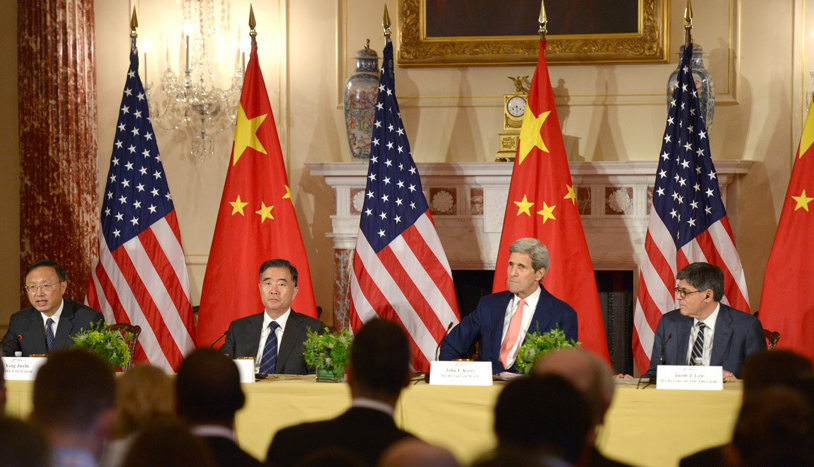Consensus reached on range of issues at China-US dialogues

Yang Jiechi, Wang Yang, John Kerry and Jack Lew attend the seventh meeting of China-US Strategic and Economic Dialogue on June 23 in Washington.
Washington hosted the seventh meeting of the China-US Strategic and Economic Dialogue and the sixth China-US High-Level Consultations on People-to-People Exchanges from June 23 to 24.
At the strategic dialogue, participants, including nearly 400 Chinese officials, exchanged opinions on seminal bilateral, regional and global issues and achieved 127 outcomes in nine areas. A total of 119 agreements were reached in such spheres as education, culture and health.
The two events were conducive to the structuring of a new model of major-country relations, setting the stage for the formal meeting between Chinese President Xi Jinping and US President Barack Obama three months from now.
A number of top government officials delivered speeches at the strategic dialogues, including State Council vice-premiers Liu Yandong and Wang Yang, State Councilor Yang Jiechi, US Vice-President Joe Biden, US Treasury Secretary Jack and US Secretary of State John Kerry.
It takes the hard work and dedication of politicians and diplomats to structure a new model of major-country relations, Liu said. Moreover, it also requires the general public to fully understand and support the cause. China and the US should join together to build a platform for people-to-people exchange and forge a more hospitable environment for cross-civilizational dialogues and mutual learning. The goal is to upgrade the geniality, resilience, depth and horizon of our relations, she said.
Wang said China and the US must avoid Thucydides’ Trap, which refers to tensions resulting when a new power rises to challenge an existing hegemony. Furthermore, the two countries should march toward common peace through building a new model of major-country relations.
Biden said the China-US partnership has already borne numerous fruits in many areas, and the US is looking forward to expanding bilateral cooperation. In the interests of stable long-term relations, the two countries should handle disagreements properly and compete with each other on fair terms to address the global challenges of the 21st century, he said.
Initiated in 2009, the strategic and economic dialogue provides a communication platform for China and the US to address opportunities and challenges in bilateral, regional and global issues. Although the two countries reached more than 70 agreements involving economic benefits, little, if any, progress has been made on the issue of trade protectionism.
Climate change and energy security were prioritized as never before. A total of 44 outcomes achieved at the dialogues are related to the two issues. China and the US will carry out and renew the agreement on reducing carbon footprint and utilizing new energy resources reached in 2014. A conference on ocean protection was staged at the dialogues, showing the concern of both sides about maritime environmental issues. Moreover, the US pledged to set an example for combating transnational corruption and implementing relevant regulations formulated by G20 countries in a joint effort with China.
It is imperative for China and America to change their old ways of thinking, said Li Cheng, director of the John L. Thornton China Center at the Brookings Institute and the National Committee on US-China Relations. First, China and the US benefit the most from economic globalization. Both the Asia Infrastructure Investment Bank and the Trans-Pacific Partnership are of global significance in economic as well as political terms. It is hard to imagine that any economic integration efforts would succeed without the participation of China and the US, the world’s largest and second-largest economies, respectively.
Second, network attacks pose an unprecedented threat to global peace and prosperity. As responsible stakeholders, China and the US must formulate a set of international standards, technical mechanism and risk-control systems to protect cyberspace, Li said.
The economic sphere will not be affected by the myriad security disputes plaguing China-US relations, said David Dollar, a senior research fellow at John Thornton China Center. On the contrary, economic dialogues have become increasingly crucial amidst the precarious situation triggered by securities issues, Dollar said.
Jiang Hong is a reporter at the Chinese Social Sciences Today.

 PRINT
PRINT CLOSE
CLOSE